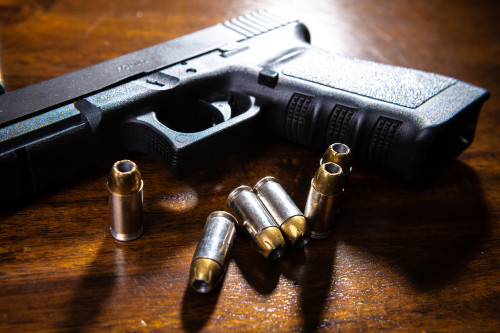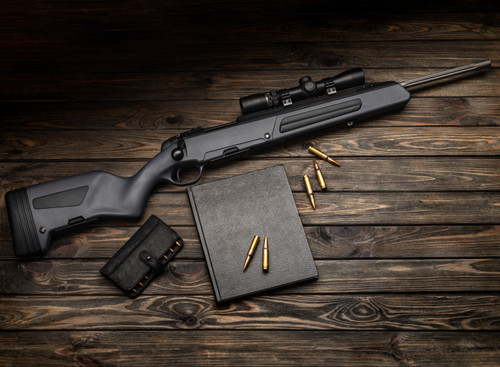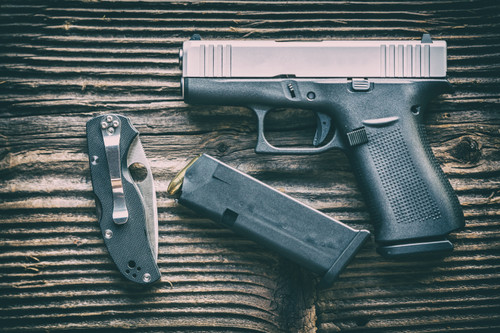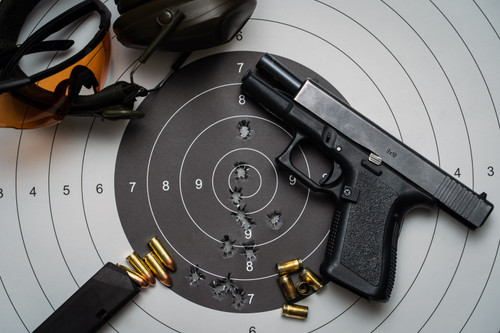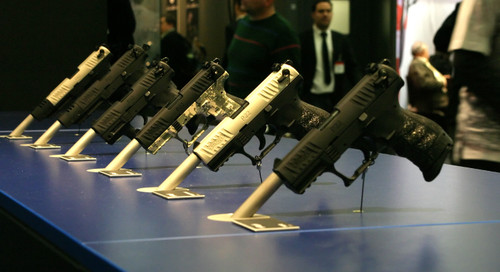Welcome back! Today, at Pro Armory, we are jumping back to the Second World War as we take a look into Staff Sergeant Edward Allen Carter Jr.. First, however, a little back story on why this story is a big deal. You see, Edward Carter Jr. did not start out in the U.S. Military. Instead, he grew up in India with his missionary father and Indian mother. From the start, Edward learned from his father and mother what it meant to have little in life, but yet have everything one needs without the fluff. That lack of fluff allowed Edward to develop a strong sense of character angled towards fighting for what is right in the world. It was this sense of moral justice and equality that led him on a worldly journey against the movement of evil manipulating its way into positions of strength around the globe. Thus, over the next five decades, Edward Carter Jr. would consistently find himself on the front lines, fighting the good fight against the inequalities and injustices of the world, without much regard for his own image and self preservation.
In 1932, at the ripe young age of 16, Edward, now living in China, ran away from his home, spurred by the mass genocides of innocents, to fight in the Chinese Military. He saw what was happening to the Chinese people and went to aid in the fight against the invading Japanese Empire, who was murdering the Chinese people simply because they were seen as inferior. After a couple years of fighting in China, he went to Spain to fight in the Abraham Lincoln Brigade against the fascists who were growing in power in the recovering powers of the old world. This is where Edward would call home until the U.S. began to ramp up to join the Second World War and push Fascism back into the hole whence it came. As the 1940’s approached, Edward finally found his way to the States, and just in time too. This is where the story comes full circle, and we see the true American hero we now know.
You see, segregation was still very real and very alive in the U.S. military at this time. Stephen Ambrose, a famous WWII historian speaks on the absolute irony of the matter saying, “The world's greatest democracy, fighting the world's worst racist (Hitler), with a segregated Army.” I mean, how ridiculous is this? The African American MP units guarding the German POWs could not even eat in the restaurants contracted to feed the German Prisoners. African American Soldiers, Sailors, and Marines, were all segregated to jobs that had little to no front line activity. The reason for this, at least the more common rationale, was that there was a stigma that African American soldiers were not as brave or as capable as Whites and could not perform in a combat role. However, this stigma for what we call Big Army, was not shared throughout the front lines. As the conflict raged, a serviceman’s race played less and less a role, and merit began to take over. This is where we find Staff Sgt. Carter Jr.. Staff Sgt. Carter Jr. started out the conflict Assigned to the “1st Infantry Company Provisional, 7th Army (Negro Company),” merely running supplies to the troops on the front. After the Battle of the Bulge, however, the Army was hurting for manpower. Thus, 4000 African American soldier volunteers were accepted into combat arms units to compensate for losses sustained.
There was a catch, though. Every African American serviceman who volunteered, also had to take a demotion in rank. This meant that each soldier who opted into this opportunity, willingly set themselves back in pay and rank for the chance to prove they are there to protect the country with the same sacrifices as their brothers in arms. Staff Sgt. Carter Jr. at the time, became PVT. Carter Jr. as he stepped forward for service in the 56th Armored Infantry Battalion in March 1945, as the unit pushed towards the Rhine. The 56th Armored probed the Rhine up and down, looking for a bridge that had not been destroyed by the retreating German Army. Though it seemed unlikely, the rumor was that there was a bridge still intact just north of the town of Mannheim. As Carter and the 56th approached the bridge, German resistance swelled to slow the American advance. What happened next is what PVT. Carter had to say about it:
MEDAL OF HONOR CITATION
“For conspicuous gallantry and intrepidity at the risk of his life above and beyond the call of duty: Staff Sergeant Edward A. Carter, Jr. distinguished himself by extraordinary heroism in action on 23 March 1945. At approximately 0830 hours, 23 March 1945, near Speyer, Germany, the tank upon which Staff Sergeant Carter was riding received bazooka and small arms fire from the vicinity of a large warehouse to its left front. Staff Sergeant Carter and his squad took cover behind an intervening road bank. Staff Sergeant Carter volunteered to lead a three-man patrol to the warehouse where other unit members noticed the original bazooka fire. From here they were to ascertain the location and strength of the opposing position and advance approximately 150 yards across an open field. Enemy small arms fire covered this field. As the patrol left this covered position, they received intense enemy small arms fire killing one member of the patrol instantly. This caused Staff Sergeant Carter to order the other two members of the patrol to return to the covered position and cover him with rifle fire while he proceeded alone to carry out the mission. The enemy fire killed one of the two soldiers while they were returning to the covered position, and seriously wounded the remaining soldier before he reached the covered position. An enemy machine gun burst wounded Staff Sergeant Carter three times in the left arm as he continued the advance. He continued and received another wound in his left leg that knocked him from his feet. As Staff Sergeant Carter took wound tablets and drank from his canteen, the enemy shot it from his left hand, with the bullet going through his hand. Disregarding these wounds, Staff Sergeant Carter continued the advance by crawling until he was within thirty yards of his objective. The enemy fire became so heavy that Staff Sergeant Carter took cover behind a bank and remained there for approximately two hours. Eight enemy riflemen approached Staff Sergeant Carter, apparently to take him prisoner, Staff Sergeant Carter killed six of the enemy soldiers and captured the remaining two. These two enemy soldiers later gave valuable information concerning the number and disposition of enemy troops. Staff Sergeant Carter refused evacuation until he had given full information about what he had observed and learned from the captured enemy soldiers. This information greatly facilitated the advance on Speyer. Staff Sergeant Carter's extraordinary heroism was an inspiration to the officers and men of the Seventh Army, Infantry Company Number 1 (Provisional) and exemplified the highest traditions of the military service.” (https://www.cmohs.org/recipients/edward-a-carter-jr)
Just wow, am I right? There are no words to explain the inspiration this act of gallantry swells as you read the citation. Not only did Eddie Carter do this incredible act, he also goes AWOL from the field hospital after a couple weeks recovering from his wounds, to rejoin his unit in the final push into Germany! That is the kind of man we are dealing with. He was not a man for the tic-or-tape parade, he was a man driven by a sense of purpose and a dream of what the U.S. could be for his family and their future.
Would you believe that even after all this, Staff Sgt. Carter Jr. only received the Distinguished Service Cross, the second highest award for valor in the service. He would not put up for the well deserved Medal of Honor until long after he passed away. In fact, it would be his children who would receive the honor on his behalf on January 13, 1997.
This did not mean that there was a lack of appreciation for his actions, or sacrifices, though. Once Edward Carter returned from the front, he was shown the utmost appreciation for his service. Whites and African Americans alike knew of Carter’s actions on March 23, taking on a fortified enemy position alone. Capturing two German prisoners, and interrogating them in their own language, all while bleeding out on the way back to the American column. All to still refuse to be taken to a field hospital until he had given a full intelligence report to his commander about what he had learned. His children were able to walk down the street and be recognized as Edward Carter’s kids. Furthermore, despite being denied the recommendation for the Medal of Honor, Carted remained a patriot, volunteering to continue service in the U.S. Military as an MP until his Honorable discharge in 1949. Edward Carter died in 1963 from lung cancer, due to shrapnel that was lodged in his neck during the War.
After everything, this true patriot, this valiant soldier, stood true to a Nation still struggling within itself. As his kids grew, in the heart of the struggle for equality among all races, he told his kids, “love this country, it's the best you could ever be in.” Thus, encouraging unity and equality, knowing that the struggles faced by African Americans would too, pass in time.
Therefore, in parting, I lay a question to think about and reflect on, at your feet. Would you, in a similar situation, be willing to forfeit your rank to serve a cause you know is just, even if societal norms are unjustly against you, and lay down your life for the idea and dream greater than yourself?
I hope that you all enjoyed this week's write-up on the Pro Armory Blog! We will see you next week for more stories on our American Heroes! Always remember to get trained, know your rights, and stay vigilant!



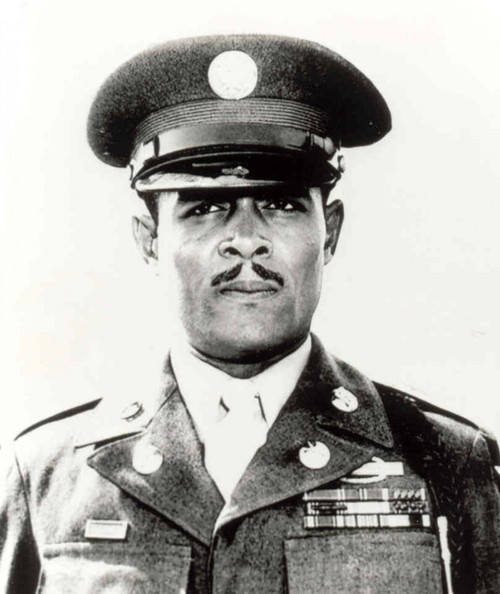
 Gabriel Eck
Gabriel Eck

